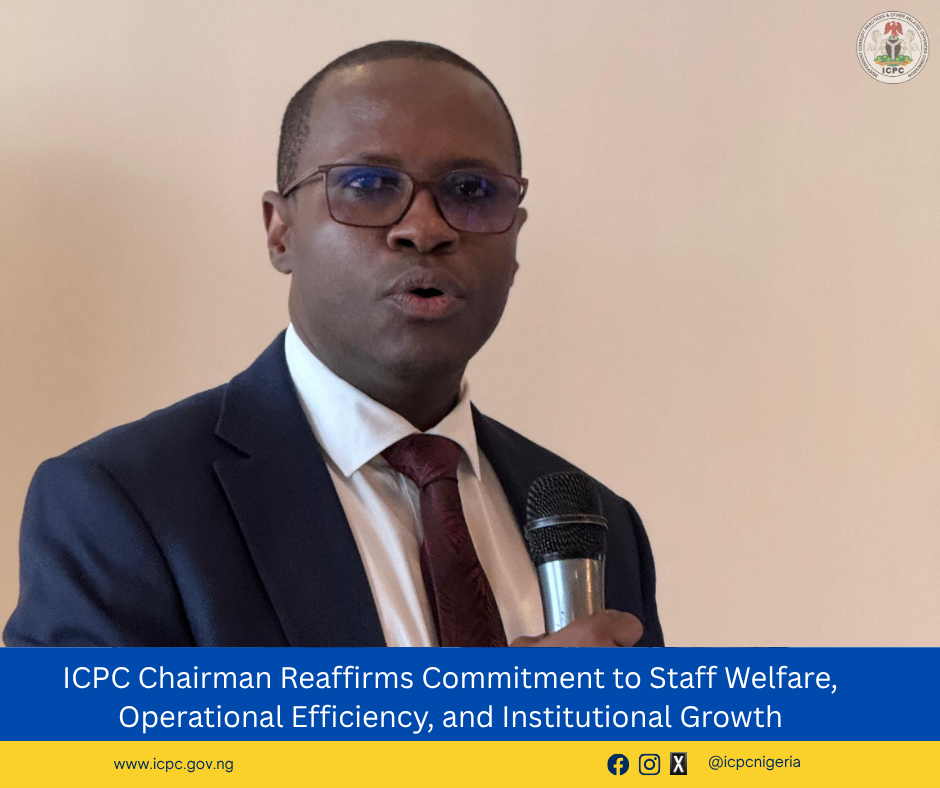The Chairman of the Independent Corrupt Practices and Other Related Offences Commission (ICPC), Dr. Musa Adamu Aliyu, SAN, has reiterated his administration’s commitment to strengthening operations, prioritizing staff welfare, and building a more resilient institution capable of tackling corruption at all levels.
Speaking during an interactive session with the Commission’s staff on Tuesday, Dr. Aliyu emphasized his open-door leadership style, noting that since assuming office in December 2023, he has remained a listening leader focused on inclusive progress.
“ICPC is not the first place I have led as a chief executive, but it is one of the most important. The task before us is to ensure that corruption does not find a place in Nigeria, especially within our institutions,” he said.
Reflecting on the Commission’s 25th anniversary, Dr. Aliyu recalled that the milestone would be formally celebrated later this year.
According to him, the event will provide an opportunity to reflect on ICPC’s achievements, challenges, and strategies for future success. He also paid tribute to the pioneers who established the Commission, stressing that their contributions will always be remembered.
On funding, the Chairman acknowledged the Commission’s financial constraints, explaining that it is still operating on the 2024 budget while awaiting the implementation of the 2025 fiscal plan. Nonetheless, he disclosed that allocation has been made for the Commission’s permanent headquarters.
Reassuring staff of management’s efforts to improve working conditions, Dr. Aliyu revealed that discussions were ongoing to secure an exit package and strengthen operational support.
“We will do our best to enhance your welfare. You will see a lot of changes and something good before the end of the year,” he assured.
He further disclosed that the Commission was pursuing local and international training opportunities for staff, in addition to addressing issues relating to promotions and arrears.
While commending staff for their dedication, Dr. Aliyu cautioned against lateness, indiscipline, improper dressing, and financial misconduct, which he described as unacceptable for officers of the Commission.
On financial impropriety, he stressed that after the current grace period, the Commission would enforce appropriate rules. “We must project the right image by being disciplined, punctual, and presentable,” he warned.
Highlighting ICPC’s rising international profile, the Chairman pointed to his role as Chair of the Forum of Heads of Anti-Corruption Agencies in Africa, which has placed Nigeria in a strategic global position.
He also referenced the recent signing of a Memorandum of Understanding (MoU) with Saudi Arabia’s anti-corruption agency, Nazaha, as a step towards stronger international collaboration.
Dr. Aliyu underscored the need for restructuring in line with global best practices, urging staff to embrace change and fully deploy the Commission’s approved powers to strengthen independence and service delivery.
“Resistance to change will negatively affect the Commission’s success. Fighting corruption is not easy it has deep roots in our society. But if we stay disciplined and committed, ICPC will emerge as a brand-new agency before the end of this dispensation,” he affirmed.


